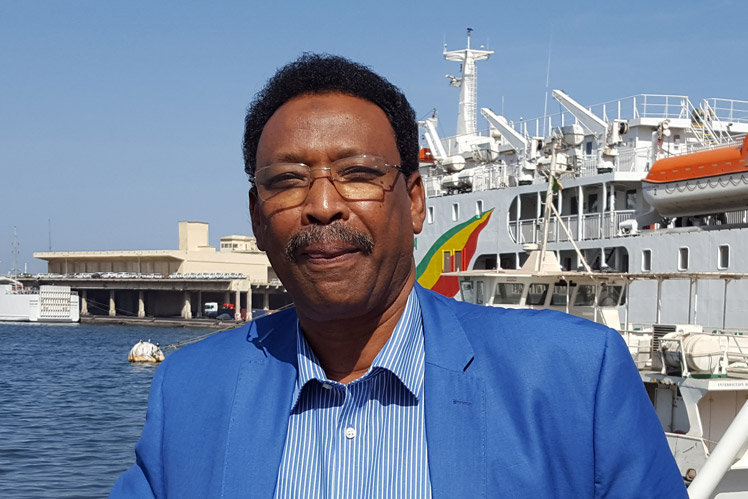Iodine Global Network (IGN)
Sprunglinks/Accesskeys
Zur Startseite (Accesskey 0) Direkt zur Hauptnavigation (Accesskey 1) Direkt zum Inhalt (Accesskey 2) Kontakt (Accesskey 3) Sitemap (Accesskey 4) Suche (Accesskey 5)
DONATE

Izzeldin Hussein, Regional Coordinator in the Middle East and North Africa

Dr. Izzeldin Sharief Hussein, Regional Coordinator in the Middle East and North Africa
About Izzeldin Hussein
A Global Public Health Practitioner with a medical background, Dr. Izzeldin Sharief Hussein is currently the Regional Coordinator for the Iodine Global Network (IGN) in the Middle East and North Africa. Izzeldin is also a special advisor to the Ministry of Health in Oman and an educator at Universities in Oman and in the UK.Izzeldin’s contributions in combatting iodine deficiency
Following his training as a medical doctor, he began his career in public health with CARE International on the Ethiopian border with Sudan where Izzeldin was initially in charge of emergency and relief services, eventually shifting to manage the health and nutrition program for over 3000 displaced persons. After a stint working for the World Health Organization (WHO) in 1990, he left for Oman to establish the Micronutrients and Salt Iodization unit in the Ministry of Health and has since been involved with salt iodization, food fortification, community development, food-based system approaches for the prevention of malnutrition, as well as the reduction of poverty and non-communicable diseases (NCDs). Well known in the region as a leader for USI, Izzeldin helped develop the first salt plant in Oman, working alongside Dr. Venkatesh Mannar (IGN Board member) to produce iodized salt and collected data on the performance of the USI program.In 1992, Izzeldin was recruited as a consultant by UNICEF to help develop the national USI program in Egypt together with Dr. Fereidoun Azizi from Iran. Being afforded the opportunity to work in the field with salt producers, he facilitated the establishment of Egypt’s first Salt Producer’s Association, which still operates today.
Izzeldin joins ICCIDD, now known as IGN
Izzeldin first participated in an IGN meeting (then known as ICCIDD) in 1997, and soon was recruited as a Regional Coordinator (RC) in 2006. As an RC, he has worked closely with country program managers in dozens of countries and has contributed to an increase in the supply of iodized salt in Tunisia, Egypt, Oman, Bahrain, Kuwait, KSA, UAE and Iran. He has also helped design and support the implementation of national iodine surveys in many countries, even in settings which have been political challenging such as Yemen, to help document the extent of iodine deficiency and track the performance of programs. His most notable work has undoubtedly been in his motherland of Sudan, which has long had the greatest burden of iodine deficiency in the region. Through his efforts, he has been able to bring together all key stakeholders and partners engaged in the national iodine program to significantly upgrade its salt industry, increase the supply and affordability of adequately iodized salt and encourage additional investments in modern plants. In Feb, 2018, Izzeldin was instrumental in helping the Government of Sudan open three new salt iodization plants . Most of all, Izzeldin’s work has helped to raise awareness among policy makers about the importance of iodine nutrition. His efforts have paid off handsomely as the coverage of the population is now estimated to have reached 50%, whereas it was a 9% just a few years ago and he continues to explore how to fill the remaining gap.
. Most of all, Izzeldin’s work has helped to raise awareness among policy makers about the importance of iodine nutrition. His efforts have paid off handsomely as the coverage of the population is now estimated to have reached 50%, whereas it was a 9% just a few years ago and he continues to explore how to fill the remaining gap.Looking toward the future
Izzeldin firmly believes that universal salt iodization programs should be affordable and available across all areas of society, irrespective of economic barriers. He credits his ability to have achieved so much in combatting IDD to IGN’s mandate, which focuses on how all stakeholders engaged in USI programs can collaborate most effectively and design programs that achieve and sustain results.“My dream is to continue exerting more efforts and move toward a world free of iodine deficiency. One of the most effective tools that will help with this is having IGN spread the word and draw attention to our cause, garnering more support and contributions to IGN.”
Contact us
Our offices
Finance Office (Registered Office)
P.O. Box 51030
375 des Epinettes
Ottawa, Ontario, Canada K1E 3E6
accounts@ign.org
Office of Executive Director
6016 1st Ave NW
Seattle, WA 98017
USA
Communications Team - IDD Newsletter - The Iodine Blog
info@ign.org
newsletter@ign.org
P.O. Box 51030
375 des Epinettes
Ottawa, Ontario, Canada K1E 3E6
accounts@ign.org
Office of Executive Director
6016 1st Ave NW
Seattle, WA 98017
USA
Communications Team - IDD Newsletter - The Iodine Blog
info@ign.org
newsletter@ign.org